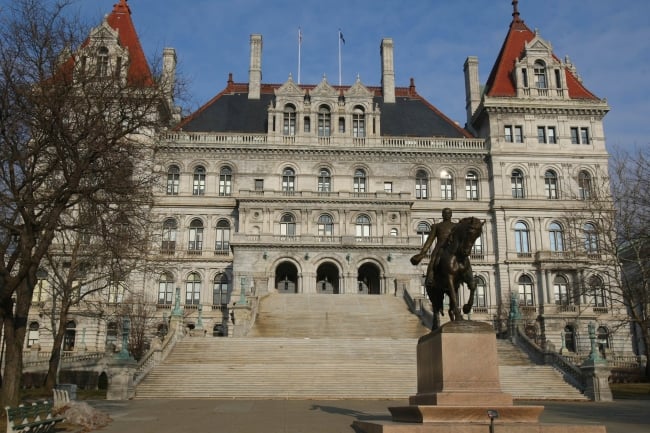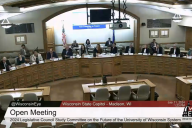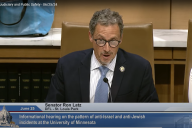You have /5 articles left.
Sign up for a free account or log in.

The New York Assembly has proposed adjustments to the state’s largest need-based aid program that could serve tens of thousands of additional students.
Daniel Barry/Getty Images
New York State lawmakers are pushing to increase the number of students who qualify for state financial aid.
Leading members of the State Assembly’s Standing Committee on Higher Education want to raise the income cap for New York’s largest grant program, the Tuition Assistance Program, or TAP, from $80,000 to $110,000 a year. The committee held a public hearing last week to draw attention to the proposal and seek input from state education officials, university administrators and representatives of higher ed associations.
“Even if you do make $80,000 you’re only eligible for $500 of TAP money,” Pat Fahy, a Democrat and chair of the committee, said of the current income cap. “Especially if you’re living in somewhere like New York City or suburban Long Island, $80,000 does not stretch far at all.”
About 230,000 students qualified for the state grant in 2022–23. Fahy’s office estimates that raising the cap could open the door for “thousands, if not tens of thousands” more students to benefit from the need-based aid.
Passing ‘Critical Pieces’
The hearing also touched on the possibility of renewing eligibility for TAP to graduate students, doubling the minimum award from $500 to $1,000, raising the qualifying income level for single working adults and introducing a constitutional amendment that would require the TAP program to be regularly adjusted for inflation.
Assemblyman Robert Smullen, a Republican and ranking member of the committee, said there is bipartisan agreement on the need for an overhaul of the program.
“New York State does not do a good job in accounting for inflation when we fund these programs,” Smullen said. “It behooves us to make sure that the students who really need TAP are the ones that really get it.”
Committee members say proposals for adjusting the program, despite gaining support, will face steep challenges, as the state grapples with a formidable $4.3 billion budget deficit and competing interests for limited funds, including among programs to address the state’s affordable-housing crisis.
Although state budget directors said earlier this month that Governor Kathy Hochul doesn’t plan to roll back education funding, that doesn’t guarantee support for the budget increase that the proposed TAP adjustments would demand.
Hochul, a Democrat, has not indicated whether she supports or opposes increasing funding for the TAP. Her deputy communications director, Katy Zielinski, declined to answer specific questions about expanding the program.
“Governor Hochul will unveil the details of her Executive Budget next year, as required by law,” Zielinski said in an email.
Some state lawmakers are optimistic about the chances of increasing eligibility for the program.
“Something is going to have to give, but I want to make sure that the core TAP program is not where that give is,” Smullen said.
Sarah Clark, a Democrat and chair of a TAP subcommittee, noted that the proposal to increase TAP funding was gaining support before the pandemic, and college access and affordability continue to be a growing focus of students, state and federal lawmakers, and the U.S. Department of Education and the White House.
“We’re starting to see the impact of student loans,” Clark said. “That sort of crushing debt is having ripple effects well beyond even graduates’ own ability to make a living. So we need to really examine what we’re doing and help more people.”
Cost Worth the Investment
Other states have already put similar measures into effect. Massachusetts expanded its MassGrant program to fully cover tuition and fees for Pell Grant–eligible students and to cover 50 percent of tuition for students from families with up to $100,000 in household income. New Jersey has also increased funding for its College Promise programs.
A slew of bills to adjust TAP are pending in the higher ed committee. Fahy and Clark said legislators on both sides of the aisle will negotiate and determine which bills to support and introduce as a package in the Assembly.
“Quite frankly, it’s the whole reason why I did the hearing now instead of in January, when we come back into session,” Fahy said. “I wanted to start the momentum now.” The nearly 50-year-old grant program was designed to help New Yorkers from both low- and middle-income backgrounds access college. But with only minimal adjustment made over the last 20 years, the program is no longer meeting its intended purpose, lawmakers and higher ed officials said.
Some changes were made in the 2022–23 academic year, including a $500 increase in the maximum award, restored eligibility for incarcerated students enrolled in prison college programs and the extension of grants to some part-time undergraduates and students pursuing workforce credentials. Funding also was slightly increased from $662 million in 2022–23 to $764 million in 2023–24.
Guillermo Linares, president of the Higher Education Services Corporation, New York’s financial aid agency, said during the hearing, “TAP has provided nearly $30 billion to help more than six million New Yorkers who have pursued a college education in our great state. Today, TAP continues to be one of the nation’s largest need-based college financial aid programs.”
He noted, however, that “the expansion of TAP has long been a pressing matter.”
Angela Liotta, a spokesperson for the agency, declined to answer specific questions about the proposal but said HESC is committed to “providing vital financial support to help all students access an affordable college education.”
The program’s maximum award, given to the state’s lowest-income students, previously covered full tuition at any public institution. But that hasn’t been the case since the 2009–10 academic year, when the maximum award was $5,000 per year and annual tuition at State University of New York system institutions was $4,995. Tuition at SUNY colleges is currently $7,070, and the maximum TAP grant award is $5,665.
SUNY chancellor John King, who also spoke at the hearing, argued that if the limit were adjusted for inflation, it would equate to $145,000 in today’s dollars.
“There’s a whole segment of the New York state population [earning] between $80,000 and $145,000. Those are middle-income families that really could use that help to afford the cost of their education. I don’t think of that as a cost so much as an investment,” King said.
The Commission on Independent Colleges and Universities, an association representing private institutions in New York, has also voiced support for TAP adjustments. Former CICU president Mary Beth Labate wrote an op-ed for The Albany Times Union in 2020, noting that private colleges had increased the level of financial aid they provide and calling on the state to follow suit.
Lola W. Brabham, the current president of the association, said in an email, “TAP must [be] adequately funded so that it can continue to be instrumental in breaking down barriers and in building pathways to upward mobility.”
Hope Despite ‘Headwinds’
Eli Dvorkin, policy director at the Center for an Urban Future, a nonpartisan policy think tank in New York City, recognized that efforts to adjust TAP face “big fiscal challenges and headwinds.”
“But if policymakers are serious about creating a stronger and more equitable economy for the long term, then investments in TAP are among the most effective options on the table,” Dvorkin said in an email. “In New York’s changing economy, a postsecondary credential has only become more essential for opening doors to well-paying jobs.”
State lawmakers from both parties emphasized that New York has experienced a sharp drop in population—especially in the rural, upstate region—and that these population shifts are hurting college enrollment. They believe making college more affordable will strengthen enrollment and boost the retention of workers in the state.
Clark also noted that the cost of adjusting TAP eligibility “is such a small amount” of the state budget, which was $232.9 billion in fiscal year 2023–24. Raising the income cap to $110,000 would cost about $7 million more annually, and increasing the minimum award would cost $10 million more. Including graduate students would be pricier, at $35 million, according to Alexander Flood, the higher education committee’s clerk.
“Getting TAP into the 21st century, to work for more families and do what it was supposed to do … It’s not as expensive as people think it is,” Clark said. “I understand the fiscal reality of our budget … Once you change these levels, they have to get built into the budget every year. So they’re harder to sell, but I think we’re gaining more and more people to really be pushing for this. I have hope.”








